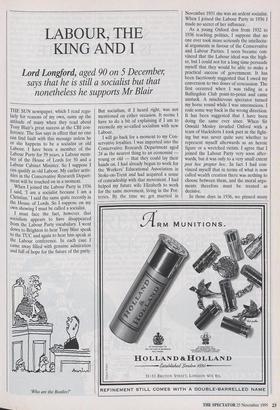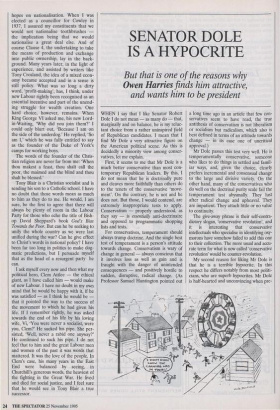LABOUR, THE KING AND I
Lord Longford, aged 90 on 5 December
says that he is still a socialist but that nonetheless he supports Mr Blair
THE SUN newspaper, which I read regu- larly for reasons of my own, sums up the attitude of many when they read about Tony Blair's great success at the CBI con- ference. The Sun says in effect that no one can find fault with this message unless he or she happens to be a socialist or old Labour. I have been a member of the Labour Party for 59 years, a Labour mem- ber of the House of Lords for 50 and a Labour Cabinet Minister So I suppose I can qualify as old Labour. My earlier activ- ities in the Conservative Research Depart- ment will be touched on in a moment.
When I joined the Labour Party in 1936 I said, 'I am a socialist because I am a Christian.' I said the same quite recently in the House of Lords. So I suppose on my own showing I must be called a socialist. I must face the fact, however, that socialism appears to have disappeared from the Labour Party vocabulary. I went down to Brighton to hear Tony Blair speak to the TUC and again to hear him speak at the Labour conference. In each case I came away filled with genuine admiration and full of hope for the future of the party.
`Who are the Beatles?' But socialism, if I heard right, was not mentioned on either occasion. It seems I have to do a bit of explaining if I am to reconcile my so-called socialism with new Labour.
I will go back for a moment to my Con- servative loyalties. I was imported into the Conservative Research Department aged 24 as the nearest thing to an economist young or old — that they could lay their hands on. I had already begun to work for the Workers' Educational Association in Stoke-on-Trent and had acquired a sense of comradeship with that movement. I had helped my future wife Elizabeth to work for the same movement, living in the Pot- teries. By the time we got married in November 1931 she was an ardent socialist. When I joined the Labour Party in 1936 I made no secret of her influence.
As a young Oxford don from 1932 to 1936 teaching politics, I suppose that no one ever took more seriously the intellectu- al arguments in favour of the Conservative and Labour Parties. I soon became con- vinced that the Labour ideal was the high- er, but I could not for a long time persuade myself that they would be able to make a practical success of government. It has been facetiously suggested that I owed my conversion to two doses of concussion. The first occurred when I was riding in a Bullingdon Club point-to-point and came unstuck. A mischievous spectator turned my horse round while I was unconscious. I rode some way back in the wrong direction. it has been suggested that I have been doing the same ever since. When Sir Oswald Mosley invaded Oxford with a team of blackshirts I took part in the fight- ing but was never quite sure whether to represent myself afterwards as an heroic figure or a wretched victim. I agree that I joined the Labour Party very soon after- wards, but it was only to a very small extent post hoc propter hoc. In fact I had con- vinced myself that in terms of what is now called wealth creation there was nothing to choose between them, and the moral argu- ments therefore must be treated as decisive.
In those days in 1936, we pinned many hopes on nationalisation. When I was elected as a councillor for Cowley in 1937, I assured my constituents that we would not nationalise toothbrushes the implication being that we would nationalise a great deal else. And of course Clause 4, the undertaking to take the means of production and exchange into public ownership, lay in the back- ground. Many years later, in the light of experience, and assisted by writers like Tony Crosland, the idea of a mixed econ- omy became accepted and in a sense is still policy. What was so long a dirty word, 'profit-making', has, I think, under new Labour rightly been recognised as an essential incentive and part of the unend- ing struggle for wealth creation. One hard choice, however, remains. When King George VI asked me, his new Lord- in-Waiting, 'Why did you join them?' I could only blurt out, 'Because I am on the side of the underdog.' He replied, 'So am I,' which he was fully entitled to say as the founder of the Duke of York's camps for working boys.
The words of the founder of the Chris- tian religion are never far from me: 'When thou makest a feast, thou shalt call the poor, the maimed and the blind and thou shalt be blessed.'
Tony Blair is a Christian socialist and is sending his son to a Catholic school. I have no doubt that those words mean as much to him as they do to me. He would, I am sure, be the first to agree that there will always be plenty of room in the Labour Party for those who echo the title of Bish- op David Sheppard's book God's Bias Towards the Poor. But can he be seeking to unify the whole country as we were last unified during the war? Can he give effect to Christ's words in national policy? I have been far too long in politics to make dog- matic predictions, but I persuade myself that as the head of a resurgent party he can.
I ask myself every now and then what my political hero, Clem Attlee — the ethical giant, as I have called him — would make of new Labour. I have no doubt in my own mind that he would be happy with it, if he was satisfied — as I think he would be that it pointed the way to the success of the movement to which he had given his life. If I remember rightly, he was asked towards the end of his life by his loving wife, Vi, 'You were never a socialist, were you, Clem?' He sucked his pipe. She per- sisted, 'Well, never a rabid one anyway?' He continued to suck his pipe. I do not feel that to him and the great Labour men and women of the past it was words that mattered. It was the love of the people. In Clem's case, his many years in the East End were balanced by seeing, in Churchill's generous words, the heaviest of the fighting in the Great War. He lived and died for social justice, and I feel sure that he would see in Tony Blair a true successor.



















































































 Previous page
Previous page